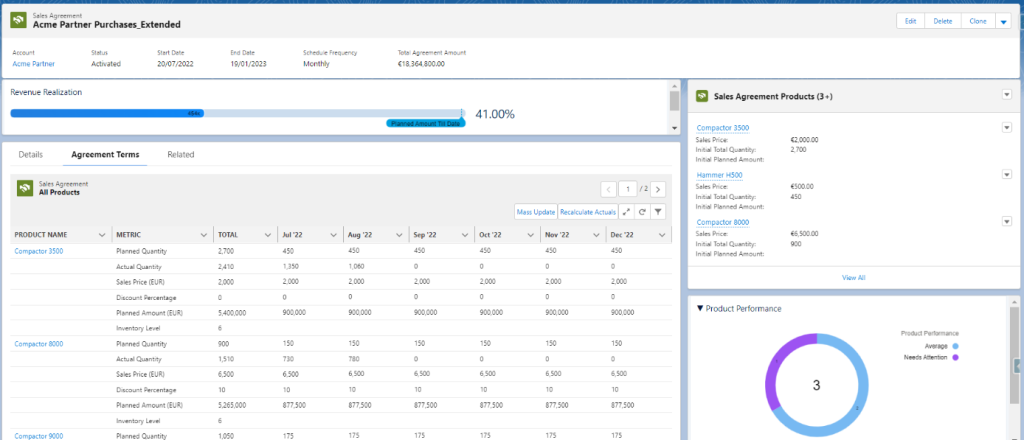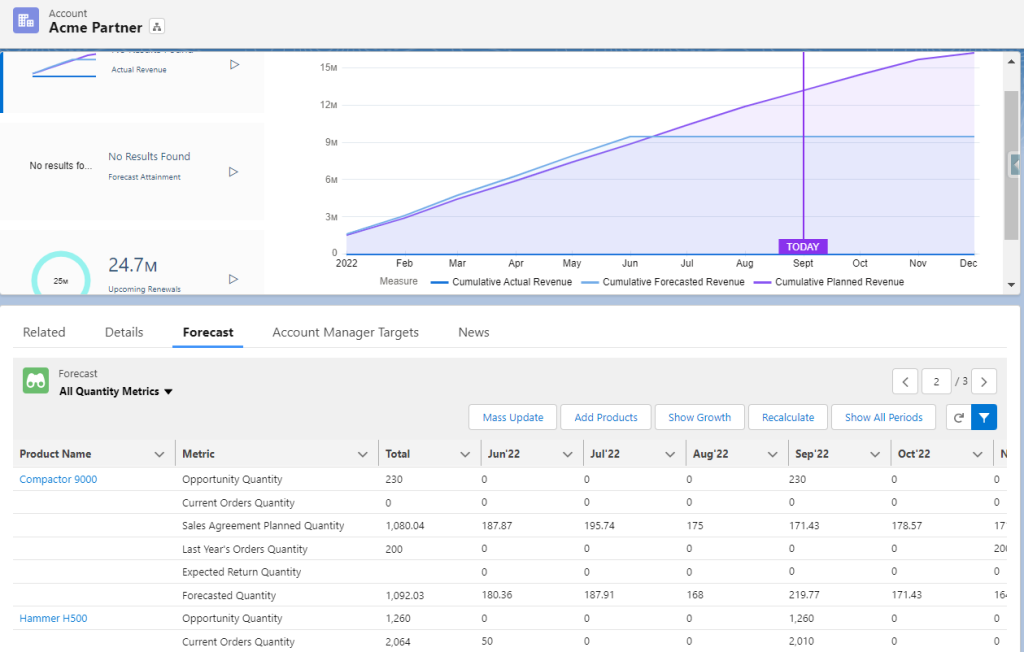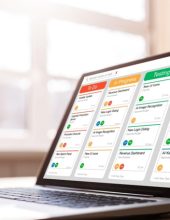Salesforce is constantly developing new products to address the challenges of their customers. After implementing more complex and customized solutions, they began focusing on more specific business use cases that can be implemented in a particular sector of the market. With such idea in mind, Salesforce launched in 2019 a new product called Manufacturing Cloud that can support the manufacturing industry.
Why Manufacturing Cloud when we already have Sales Cloud and Service Cloud?
To understand the advantages of Manufacturing Cloud let’s take a look at the core – Sales Cloud and Service Cloud. Generally, Sales Cloud covers the end-to-end sales process starting from getting a new lead, meaning a potential customer and once prospecting converting a potential customer into our regular one as the Account so that they can be linked to the opportunities containing products the customer is interested in and make orders to buy such products. As for the Service Cloud, it’s basically a platform that delivers support for customers anytime and anywhere using many different tools and features like self-service or different channels of communication.
While Sales and Service Cloud provide a base platform and core functionalities for the general sales and service processes, Manufacturing Cloud extends its features to points that are crucial for the manufacturing industry.
What is a Manufacturing Cloud and what does it change?
Manufacturing Cloud is a solution that allows manufacturers to manage their run-rate business meaning their existing customers. It is a clear and comprehensive tool to keep track of all the activities that customers are making. It provides a full view of both new and existing businesses. What is more, it gives all teams involved in the process of fulfilling orders a clear view what is the current status of each step and predictions of future demand for particular products.
What can we gain with Manufacturing Cloud?
While all businesses are based on opportunities and orders related to them, for the manufacturing industry besides managing new customers, most of the sales are related to the big, long-term agreements in which customer commits to buying a certain number of particular products during the agreed schedule.
In Manufacturing Cloud such contracts can be managed with the Sales Agreement feature. It contains all the details of all products included in the agreement divided into periods depending on the configured frequency and the current coverage of the revenue. Given this insight, manufacturers can manage and monitor present and future orders.
What is more, we can configure metrics such as:
- planned quantity,
- actual quantity and others
- also custom metrics, for example, create inventory level and integrate it with the system that keeps the current stock.
Thanks to that, we are gaining more detailed information on important parameters and a clear view for our team members, which can result in increasing the effectiveness of processes and teams. The general setup of the Sales Agreement includes a parameter called Renewal Days which determines how many days before the End Date of the agreement, it can be renewed.
Besides managing current orders, in the manufacturing industry, it is also important to plan future demand and orders to avoid financial loss due to the lack of product or producing more than required and selling at a lower price. Such predictions can be obtained with the Manufacturing Cloud functionality called Account Forecast.
As many of you already know, standard Sales Cloud contains forecasting at the opportunity level, divided by the teams or team members, however with Manufacturing forecasts we can make predictions on the Account level. We are gaining a full view of the sales related to the individual in one place – on the particular Account record.
Forecasts can be generated for the specific Account based on orders, opportunities and sales agreements.
So with this functionality, we can plan future demand from both new and existing contracts. Manufacturing Cloud has 2 types of Account Forecasting – standard and advanced. The most significant differences between both of them are more complex formula possibilities, forecasting per region, additional artificial intelligence analysis or forecasting in the Service license in the advanced version.
The third interesting feature is the extension to service cloud – managing warranties. While in Service Cloud we can create products and link them, there is no standard solution for warranties – such an important factor for manufacturers.
With Manufacturing Cloud, we can manage warranties by creating warranty terms and linking them to particular products, product families or assets. As a result, we are gaining new out-of-the-box objects that can contain details about labor, parts and expenses coverage. It is a fresh new feature that was released in the Summer of ‘22 so we can expect that it would be extended in the nearest releases.
Are there any add-ons to Manufacturing Cloud?
Beside the mentioned features included in the basic license, there are an additional, extra charge, and add-ons that can contribute to enhancing our relationship with partners with the awarding system, smoother communication between team members and partners and more detailed reports and dashboards with crucial information that can improve managing our business.
The first interesting add-on is related to awarding partners for sold products. Standard programs for awarding partners are based on giving discounts before the order by lowering the price of the product. It might create the unnecessary belief that customers may wonder about the quality of the product or defects.
However, Rebate Management, an add-on dedicated to Manufacturing Cloud allows awarding customers monetary for meeting particular targets after the orders. A target can be a specific number of products or a particular product, the growth of monthly revenue in comparison to the same month from last year or custom formulas. Additionally, there is a possibility to exclude particular products from the target. What is more, we can divide the price’s value into the levels, for example, a partner will get 6$ for each product if they sell in the range of 100-200 products, while selling more than 200 products – 10$ per each product.
Second add-on is the dedicated Experience Cloud template. It consists of a dashboard containing Manufacturing related objects and their records. With such a view we can engage partners in the sale process by providing them visibility to the agreements or even giving them edit access. It facilitates communication and quicker the resolution of any doubts or misunderstandings. However please keep in mind that as this is a dashboard on a dedicated template, it cannot be used in other community templates.
Last but not least, CRM Analytics for Manufacturing. Some of you may be already familiar with the Salesforce product called CRM Analytics that is utilizing artificial intelligence mechanisms to catch, track and predict customers’ behaviour. With Analytics for Manufacturing, we are gaining additional dashboards with crucial information on how our business is performing presented in a clear and easy-to-understand view.
Manufacturing Cloud contains a dedicated app in Analytics Studio that consists of out-of-the-box reports and dashboards containing information calculated based on AI mechanisms. It provides us with a clear view of how our Accounts, Sales Agreements and products are performing, which of them need more attention, 360-view of particular Accounts, pricing details, forecast information and many more.
Summary
With the Salesforce license, we are receiving three updates of the platform per year free of charge during which Salesforce is providing improvements, extensions or new features. What is more, Salesforce is constantly upgrading Manufacturing Cloud by expanding its existing features but also by adding new functionalities released during mentioned updates. Without any doubt, this product will grow even further in order to support the manufacturing industry and cover the most crucial needs of this sector.
If this article made you at least a little interested in Manufacturing Cloud, feel free to check trailhead trailmix and Salesforce help pages.
***
If you are interested in Salesforce, read other articles by our experts: From a user to the abuser – how to become a Salesforce expert and Interaction Studio from Salesforce – catch up with basic hands-on real-time experience.


















Leave a comment